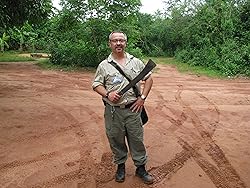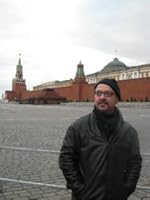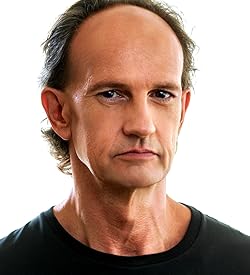 |
| Playing with a big knife in the African bush country. |
Recently, an ITW Roundtable asked me and several other authors, this question: What's the riskiest thing you've done in the name of research?
Knowing that a whole lot of peeps don't get to see the Roundtable, I though I'd publish my answer here at the Vox. So without further ado (Did you know the word "ado" can be traced back to the 1300s? As in, Much ado about nothing, which might actually be a more apt title for this piece...).
Risk or danger is relative of course.
Hemingway needed to place himself in some of the riskiest
situations possible in order to write his fiction. War, bullfights, big game hunting,
deep sea fishing, and eventually, a double-barrel shotgun barrel pressed against
his forehead. If it were physically possible to have written about the
experience after he depressed the double triggers and blew the entirety of his
cranial cap away along with most of his face, with only the lower jaws intact,
I’m sure he would have. It would have been the ultimate dangerous research act
conducted with the utmost grace under pressure.
Mailer adhered to a different opinion about risk and the
human condition. He once said that bravery isn’t just limited to placing one’s
self in perilous situations. Ultimate bravery can be the little old lady who is
half blind and half hobbled who must walk two blocks in downtown Manhattan in
order to purchase food. Every step is wracked with anxiety, every time she
crosses a busy street, she fears she might not make it to the other side alive.
Some writers go to dangerous places in order to create, not
in the physical sense, but instead, the psychological. Stephen King delves deep
into the frightening and the bizarre and I’m sure that, at times, he frightens
himself almost to death. There’s serious risk in delving deep inside the over-active
imagination. Noir writers like David Zeltserman explore the deep, darkest, places
a man or woman can go. His characters are often nonredeemable. Such as the
killing of an innocent child and not feeling a thing about it. When you write
on such topics, you risk making yourself insane.
Others like Hunter S. Thompson, experimented with drugs and
in particular, hallucinogenics in order to come up with his brand of prose…his
gonzo journalism. In the end, it left him battered at a relatively young age
and like so many writers who have lived life on the edge, he took a ticket to
ride by swallowing a semi-automatic pistol barrel.
I’ve taken some risks in order to research my novels. I’m a
firm believer that researching on Google just ain’t gonna cut the Gray Poupon
Mustard. You need to see, smell, touch, the place you are writing about. The
keen reader always knows when you’re cheating (so too do Publishers Weekly,
Kirkus, Book Reporter, etc.) When researching my first big novel, The Innocent
(formerly, As Catch Can), I spent days inside Green Haven Maximum Security
Prison and even a full night locked up in a cell at Sing Sing Prison. The novel
was praised for its realism by the trades and even the New York Post called it
“Brilliant…” An auspicious debut, but at the same time, I’d set the bar high
for myself. I could never again research a novel without talking on a certain
amount of risk.
 |
| Pretending to be the double-agent. |
As time went on I began to take more and more chances.
Exploring the bush country of West Africa where my fixer and myself managed to
get our 4X4 stuck in a swamp. The temperature was somewhere around 100 degrees
F, and the humidity enough to make my bush jacket stick to my skin. The ants
were as big as my thumb, and the mosquitos relentless. We were eventually
recused by a band of mercenaries who, along with their band of voodoo
practicing workers, pulled us out of the swamp with their own 4X4. One of them
men was convinced I’d killed many men because of the leather bracelet I wore
around my right wrist. When I gave him the bracelet, my fixer got pissed off.
“You’ve made a connection with him now,” he said. “A physical connection. He
can practice his voodoo on you now.”
Maybe a week later, while travelling the bush country along
the Nigeria border during its civil war, a soldier wearing fatigues and wrap
around sunglasses stopped out 4X4 which was occupied by myself and three
Christian mercenary women. He demanded papers and money. We were surrounded by
bush country for miles and miles. If he raped the women, and killed us, no one
would ever find our bodies. Not long after that, when I was trying to get the
hell out of the country, the soldier at the tin-roofed airport terminal
demanded a bribe in exchange for my freedom. I gave him everything I had. It
was quite the experience, and worth the risk.
Soon after that I would dodge bullets in Cairo’s Tahir Square
at the tail end of the Arab Spring. The Muslim Brotherhood and their AK-47
sporting bandits prowled the streets, making the police useless. They were a
big fan of Obama, but at the same time, hated Americans with a ferocity that
was palpable. I was forced to ID myself on the street as a Canadian to which a
native might reply, “Don’t die Canada dry.” Good times. I stupidly went out for
a jog in the early morning, and ended up surrounded by pack of wild dogs. One
of the policemen guarding my hotel came running out, swiping at the dogs with
the butt of his automatic rifle. “Don’t ever go out alone in the morning,” he
scolded. I took his advice from that moment forward. Too bad he wasn’t around
when my truck was run off the highway by another truck occupied by armed
bandits. As we sat in the ditch, the driver desperately trying to restart the
stalled engine, I was sure were about to be shot to hell. But even though the
truck stopped to check us out, they motored on.
There were the bomb scares in Istanbul, getting lost in
Shanghai, avoiding bombs and indiscriminate stabbings in Jerusalem, climbing a slick
cliff-side on Machu Piccu in Peru, breaking my foot in several places in the
Amazon Jungle, standing in the cockpit of a prop job as it flew beside the summit
of Everest in Nepal, sleeping beside the camels under the open sky in the
Sahara Desert, and of course, missing Mr. Putin by only a few moments outside
the RT news offices in Moscow’s Gorky Park.
But perhaps the riskiest moment came when I was exploring
the upper Ganges by boat along with two other women and a fixer. The wood boat
was small and cramped, it depended upon the wind for its propulsion. When there
was no wind, which was almost always the case in June, a young man rowed while
his fellow workers manned a kitchen boat that followed us. We were camping
along the shore for a few days but monsoon season storms nearly blew our camp
away during the night. It was a hell of a night, let me tell you. On the final
day on the river, the heat was so unbearable, I decided to strip down to my
boxer shorts, and jump in, much to the dismay of my fixer. But he too was so
hot he could hardly move.
“Let’s do it,” he said. Even the girls stripped down.
Swimming in the Ganges is a strange experience in that the
current is swift but the river is very shallow in places. But then the shallow
parts become very deep, dark water pools that can extend for hundreds of feet.
Little did I know it, but my fixer was an Olympic swimmer, both girls were also
no stranger to the water. When they decided to swim across a deep pool, I
didn’t want to be the one to discourage anyone. After all, it was my idea. I
run and lift weights daily, but I’m not much of a swimmer, at least when it
comes to distance. I didn’t make it half way across the pool when I began to
feel myself going under. Panic kicked in and I considered turning about, and
going back. But even that was too far away. No choice but to move forward. But
I knew I would never make it. Realization took over. Fear and panic was
replaced with total peace, if not serenity. I knew I was going to die. Die on
the Ganges, the river of death but also the river of renewed life. I had come
to India to die.
But then, maybe thirty feet ahead of me, I saw my fixer
stand up tall atop a sandbar. Just seeing him standing there filled me with
renewed hope. Flapping my arms and kicking my feet, I made it to the other
side, exhausted, my lungs straining and burning. But I was alive.
Later on I would write the third novel in my Chase Baker action/adventure
series, Chase Baker and the God Boy, and I poured all my life-and-death
experiences into it. Was the risk worth it? I think so. Readers can sense that
I’m not only writing fiction, but that I’m writing fiction based on a specific
reality. If you’re a writer, and wish to be considered the real deal, get out
of the house for a while. No one ever wrote great prose by sitting on the couch
all day and Googling your research. No one ever wrote great books without
taking risks.
So there you have it. My risk assessment. It's funny because I'm not afraid of entering into a dangerous country, or a dangerous situation for that matter, where life and limb could be compromised. But you know what scares me the most? Or put another way, what gives me nightmares? Being married again. No joke. Lately, I've been having this vivid recurring nightmare, where I wake up inside my old house, with my ex-wife (the first one), and she's yelling at me. Screaming. And I'm like, How the hell did I get here? Then she even goes so far to tell me, You're not gonna get away so easily this time, jerk!...I get the cold sweats just writing this. I'd better go do something else, take my mind off the fear, before I reduce myself to a useless heap of rags and bones.
WWW.VINCENTZANDRI.COM


